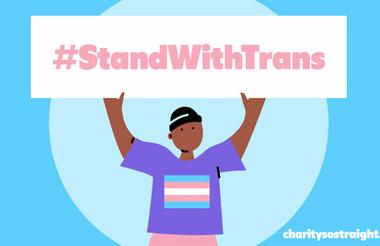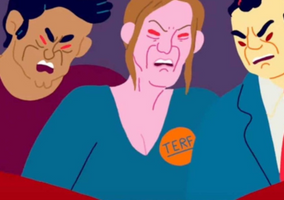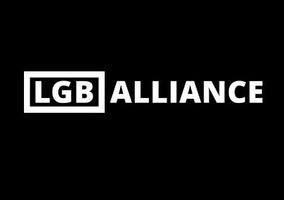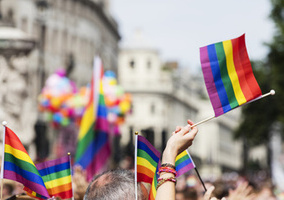Kevin Taylor-McKnight, founder of campaign group Charity So Straight, has called for charities to stand with trans people in what is an “increasingly hostile environment”.
Speaking at a Small Charity Week event yesterday, Taylor-McKnight announced the launch of his organisation’s Stand with Trans campaign, which will ask charities to sign a pledge to demonstrate that they stand with trans and non-binary people.
Taylor-McKnight said it was important for charities to create safe places for all LGBTQIA+ people to work and suggested that charity leaders should consider asking their staff to add their pronouns to their email signatures.
Charities should engage with Pride month meaningfully, he said, and urged organisations to “pause before getting the rainbow bunting and flags out”.
He also appeared to criticise Oxfam International’s recent decision to remove an LGBTQIA+ Pride video after it received pushback.
‘Share your pronouns all the time’
“If you’re comfortable sharing pronouns, do it all the time. It can make people feel more comfortable in sharing theirs. If you’re a charity leader, think about requesting people to add it to their email signature,” said Taylor-McKnight.
“By using our pronouns we encourage people to use theirs and it enables them to feel safer to do so in the workplace.”
“This is something that doesn’t take a lot of time or practice.”
He suggested charity leaders think about who might feel alienated or an outsider to their place of work when reviewing the language it uses.
Taylor-McKnight said while many grew up to believe there are two genders, “that really is not the case anymore”, so it is best for employers to avoid using language that enforces this binary thinking.
He gave the example of replacing terms like “ladies and gentleman, boys and girls, husbands and wives” with “everybody, all of you, children, young people, students”.
Engaging with Pride ‘meaningfully’
Taylor-McKnight said one way organisations can become better allies to the LGBTQIA+ community is by making time to find out more about their experiences.
“Whether that’s the dramatic rise in hate crime or the normalisation of transphobia in the media,” he said.
“The queer community is currently going through a lot, especially trans and non-binary people.”
It is important organisations consider how to engage with Pride month meaningfully and intentionally, he said.
“Pause before getting the rainbow bunting and flags out and think – what do we want to achieve by engaging with Pride?”
“I’ve seen national charities say they are going to seven prides this year – which is great, nice party – but what is the meaningful action there?”
‘Consider the pushback you might receive’
Earlier this month, Oxfam International removed an LGBTQIA+ Pride video, which featured an image of a person wearing a badge saying “terf”, a term which stands for trans-exclusionary radical feminist, after receiving criticism.
Some Twitter users suggested the person wearing the badge looked like Harry Potter author JK Rowling. Oxfam deleted its video and reuploaded it without the image.
Taylor-McKnight appeared to criticise Oxfam’s response and said it was important for charities to consider how to prepare for criticism they might receive for showing allyship to some communities.
He asked the audience: “Will you stand firm or will you take down your video?”
“Consider the pushback you might receive right from the outset,” he said.
“I don’t think that as a sector it’s good for gender conservatists to win this conversation,” he said.
Inclusive language is important
Taylor-McKnight gave examples of how charities can create an inclusive workplace for the “massive spectrum of people” from the LGBTQIA+ community.
While Taylor-McKnight is comfortable with people using the word “queer” to describe the community, he said others may not be as it has been used as a slur and to oppress people historically.
“So do check in with people first before using that to be sensitive with peoples’ lived experience.”
Many people can be afraid of getting things wrong when talking about the LGBTQIA+ community, he said.
“If you use the LGBTQIA+ term and get it wrong, that’s okay. Take steps to do it right, apologise and move on and try not to make the same mistakes,” he said
He gave the example of when he apologised after accidentally misgendering someone.
Stand with Trans campaign
Charity So Straight this week launched its Stand with Trans campaign which aims to encourage conversation about the inclusion of transgender and non-binary people in the charity sector.
“Anti-trans narrative creates an increasingly hostile community for trans and non-binary people to be in and it’s growing rapidly in the UK,” he said.
“While we cannot manage the wider picture we can manage our organisations,” he said.
Part of the campaign will give organisations the opportunity to sign the Charity So Straight pledge to demonstrate that they stand with trans and non-binary people.
Related articles












